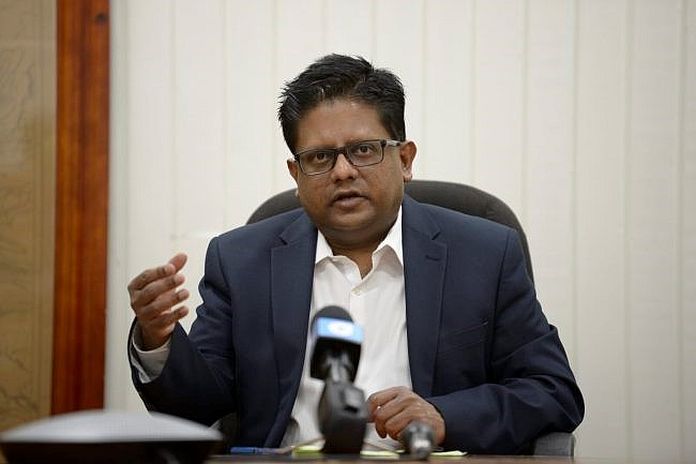GEORGETOWN, Guyana – Senior finance minister Dr Ashni K. Singh on Monday, April 5 at the ministerial conclave on human capital convened by the World Bank Group, part of the International Monetary Fund (IMF) and World Bank Group’s 2021 Spring Meetings currently being held virtually, under the theme ‘Investing in Human Capital for a Green, Resilient and Inclusive Recovery’, spoke on the topic of promoting economic opportunities while ensuring environmental and fiscal sustainability.
Minister Singh focused on Guyana’s country’s Low Carbon Development Strategy (LCDS) to be expanded and will set out a comprehensive development agenda for the country along a low carbon trajectory. And the high priority being placed by the government of Guyana on various initiatives to promote human capital development.
Guyana’s economy
Minister Singh, also highlighted Guyana’s bright economic prospects as well as the country’s vulnerabilities and development challenges, emphasizing that Guyana is rich in natural resources, including oil, minerals, and forests that cover 85 percent of the country’s territory making its economic prospects currently very promising despite COVID-19 and domestic political issues which caused a sharp contraction in non-oil GDP in 2020.
He reiterated that even with the many challenges, Guyana is still the fastest growing economy in the world as a result of its production of oil, and will remain amongst the fastest growing economies in the next few years, said: “But we also face extreme vulnerabilities to climate change, as well as significant development challenges. We are well aware of the magnitude of these challenges. They include avoiding the resource curse, promoting a strong and competitive non-oil economy, addressing our infrastructure gap, and improving human development outcomes.”
Environmental sustainability
Minister Singh highlighted the role of both the original LCDS as well as the soon to be expanded LCDS.
Guyana’s commitment to low carbon or green growth is longstanding. In 2008, we published what we believe was the first low carbon development strategy for a developing country. The LCDS reflected that Guyana is at the intersection of many different aspects of the climate challenge. On the one hand, our low-lying coast means we are heavily impacted by climate change.
The impact of climate change on Guyana
In 2005, floods caused economic damage equivalent to 60 percent of GDP. On the other hand, our forests make a very substantial contribution in the global fight against climate change. The LCDS paved the way for us to join with Norway in 2009 in the world’s third-largest international forest partnership under which the climate services provided by our forests were remunerated for the first time – making available US$250 million of performance-based payment for climate services to finance climate-friendly investments.
Guyana is now preparing an expanded LCDS which will build on the original LCDS and outline a comprehensive low carbon development agenda for Guyana.
Human capital development
Minister Singh assured the World Bank Group/ IMF 2021 Spring Meeting that the government has placed the highest level of importance on investing in human capital development and elaborated the emphasis on education.
Despite the many competing calls on our finite fiscal resources, we are investing heavily in the social sector – education, health, etc, and to facilitate infrastructure, such as information and communications technology. For example, in education, we are investing heavily in early childhood education, universal primary and secondary education, improving access to and quality of tertiary education, strengthening technical and vocational education, improving learning outcomes at all levels, and ensuring lifelong learning – supported with the use of information and communication technology based on lessons learnt during COVID-19 and all with the aim of improving production and productivity as well as individual and household well-being.
On many of these initiatives we are collaborating with the bank, and we expect the education sector to dominate our portfolio of projects with the bank in the next programming cycle … this will be in keeping with our emphasis on human capital development both as an input to, and an outcome of, sustainable economic growth … a critical prerequisite for and a critical objective of economic growth.
Source: DPI





